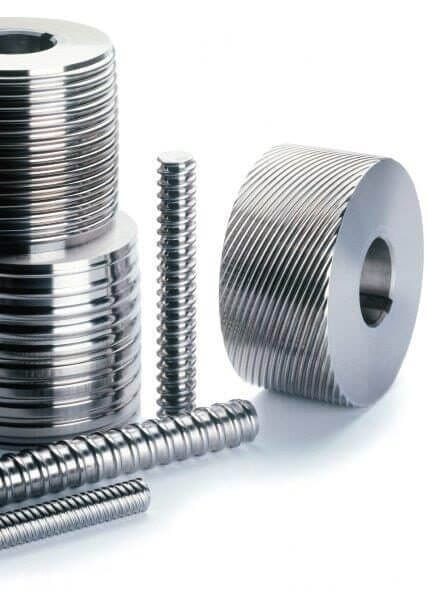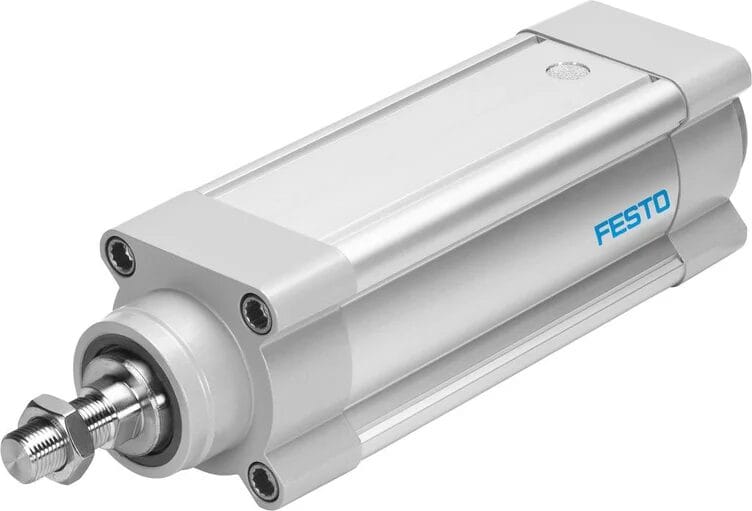Introduction
Specialist topic of thread rolling told in an exciting way .... Basics, processes, tools, applications of rolled high-tech threads
Eichenberger is publishing a technology blog series in which we introduce you to the world of chipless thread production using thread rolls.
We are committed to making your product more competitive through our contribution. With a passion for perfect movement, we challenge the limits of what is technically feasible. Find out why experienced thread rollers are sought-after specialists whose work cannot be easily copied.
Fine technology great benefits - Cold-rolled precision
When the term "thread" is mentioned, most people, whether technical laymen, designers or thread manufacturers, think of the external thread of a screw, with which fixed but detachable connections can be realized. However, in addition to the fastening thread, there is also the moving thread of a threaded or screw spindle, which is the main focus of this book.
Thread production ...
Common manufacturing processes for threads include machining and non-cutting forming methods. The former have the disadvantage that the grain flow in the material is interrupted. The fact that this impairs the strength of the component is of little concern in the case of mass-produced screws. With non-cutting forming, the material fibers are merely deflected; threads produced in this way are therefore suitable for the highest loads in high-tech applications.
... through thread rolls
In 9 technology blogs, we describe chipless thread production using thread rolling. In the associated standards, this process is often referred to as thread rolling. However, as thread manufacturers usually refer to thread rolling, this term is also preferred in these blogs.
Thread rolling is defined as the chipless production of a helical profile that is pressed into the surface of a cylindrical blank. This type of cold forming is based on the generation of high compressive stresses by means of one or more profile tools that are formed on the blank (Fig. 1). The resulting geometries are very precise and have a high surface quality. Work hardening leads to higher mechanical strength of the thread.

High-tech thread ...
The products manufactured by thread rolling are not only mass-produced parts - even the thread of a mass-produced fastening screw is almost exclusively rolled today - but also special one-off products. The latter come into question because components that work at the limit of their load-bearing capacity justify a high set-up effort. As the craftsmanship of thread rolling benefits high-tech applications, the following technology blog chapters primarily deal with the production of small and medium-sized series.
... for movement and fastening
Wherever fixed and precisely reproducible movements are required, rolled threaded spindles are currently experiencing a renaissance. Mechanical movement systems with rolled threads are not only robust and precise, but also significantly cheaper to manufacture than most (electronic) alternatives. High-tech applications for fastening threads include those with high safety requirements. The applicable standards often only permit rolled threads.
Technical principles of thread rolling
Service provider in development
With state-of-the-art production methods, many years of expertise and our tool inventory of over 1000 rolling tools, we produce rolled threads that meet even the most unusual requirements:
- Gradients up to 6 × diameter
- Spindle lengths up to 6 m
- Spindle diameter from 2 to 160 mm
- All standard profiles (M, Tr, UNC, UNF, UNEF, Whitworth)
- Multi-start threads, also as right/left-hand threads
- Steep thread profiles
- Ball screw profiles
- Special profiles
- Screw profiles (special quality and price advantages!)
- Serrations and knurling
- Conical thread
- Threads on prefabricated and/or bulky parts, e.g. also on forged parts
The 9 blogs contain excerpts from the - Library of Technology -, Volume 286, Thread rolls, included.
This book was compiled with the technical support of Kurt Husistein and published by Verlag Moderne Industrie, ISBN 978-3-937889-30-6.
Literature and sources
Kübler, Karl-Heinz, Mages Walter J. Handbook of high-strength screws, 1st ed. Essen: W. Girardet Buchverlag, 1986.
http://www.hp-gramatke.de: Hans-Peters Mathematical-Technical-AlgorithmicA linguistic smorgasbord.Verein Deutscher Eisenhüttenleute (ed.): Werkstoffkunde Stahl, vol. 1 Berlin: Springer, 1984. Apel, Heinz: Gewindewalzen: Kaltverformen von Präzisionsgewinden und Spindeln, Munich: Hanser 1952.
© 2007 All rights reserved by sv corporate media, D-80992 Munich
Illustrations: No. 1, 23-25 RWT Rollwalztechnik GmbH, Engen; No. 2 Photo Deutsches Museum, Munich; No. 3 Musée du tour automatique et d'histoire de Moutier, Moutier (Switzerland); No. 16 Fette GmbH, Schwarzenbek; No. 18 Meinrad Plaz, Staufen (Switzerland); No. 26 Habegger SA, Court (Switzerland); No. 34-36 FBT Fahrzeug- und Maschinenbau AG, Thörigen (Switzerland); No. 37, 38 Schleuniger AG, Thun (Switzerland); No. 39, 40 Max Planck Institute for Physics (Heisenberg Institute), Munich; No. 41 Saurer AG, Arbon (Switzerland); No. 42 Line Tech AG, Glattbrugg (Switzerland); all others Eichenberger Gewinde AG, Burg (Switzerland). Typesetting: abavo GmbH, D-86807 Buchloe. Printing and binding: Sellier Druck GmbH, D-85354 Freising. Printed in Germany 889030.


